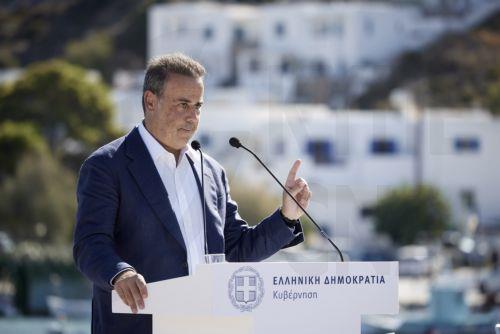Greek Energy Minister Stavros Papastavrou on Monday decried what he described as “constantly conflicting messages from the Cypriot side” over the matter of the Great Sea Interconnector, which, if completed, would connect the energy grids of Cyprus, Greece and Israel.
“The finance minister [Makis Keravnos] questions the viability of the project both before and after the meeting of President Nikos Christodoulides and Prime Minister Kyriakos Mitsotakis in New York,” he said during an appearance on Open TV.
He added that Keravnos “says that it should not be done and it is not sustainable and refers to two studies which he does not show” to Cypriot Energy Minister George Papanastasiou.
“We have a project upon which we have agreed and Keravnos is now telling the European Union that he is not going to abide by [Cyprus energy regulatory authority] Cera’s decisions. All of this creates obstacles. The project is stuck in a constant questioning of its viability,” he said.
He also made reference to comments made by Christodoulides on Sunday, wherein he had fired a shot across the bows of Greece’s independent transmission system operator Admie over its demands that Cyprus pay it €25 million for the project, and said Cyprus “will not be blackmailed by any head of Admie”.
“Fifty-one per cent of Admie belongs to the Hellenic Republic. The Hellenic Republic does not engage in blackmail. It only speaks institutionally,” Papastavrou said.
He also stressed the importance of the project to Cyprus, saying that if completed, the interconnector will “put an end to Cyprus’ energy isolation and help reduce its energy prices, which are the highest in the European Union”.
“The project is co-financed by the EU. In order for the EU to finance it, it obviously considers it sustainable. It is a project which Greece and Cyprus requested to be financed by the EU and it has so far cost €300m, which Admie has paid in full,” he said.
On this matter, he also said the project’s permit has not yet been transferred to Admie from Cyprus, two years after Cypriot company EuroAsia Interconnector Ltd quit the project and formally handed over its running to Admie.
“Reservations must be lifted for the project to proceed. It is a necessary condition that reservations about its viability be lifted and all technical and financial issues be resolved. The project is important and must proceed. All outstanding issues must be resolved immediately,” he said.
To this end, he said that when the EU’s 27 energy ministers convene later this month, “the cable will be the subject of discussion” between him and Papanastasiou.
His comments came after Christodoulides insisted that relations between Greece and Cyprus are “stronger than ever”, though this comment itself came just a single day after his references to “blackmail” and Admie.
Cyprus agreed last year to make five annual payments of €25m to Admie before the interconnector is operational.
This would in effect help finance the project and ensure that Admie, its 51 per cent shareholder and implementing body, will have a stable income while investing in the project before it turns a profit.
However, the Cypriot government has thus far withheld the funds, citing a lack of tangible progress on the project and differences in opinion regarding how the money should be sourced.
To this end, Papanastasiou had said last month that Cyprus will pay the first €25m instalment when the project is being “implemented in its entirety”, and that the construction of cables alone is “not enough” to meet this criterion.
The government had initially planned to utilise funds made available to it through the European Union’s emissions trading system (ETS) to make the payments, so as to prevent the burden of the payments from falling on the taxpayer.
Admie had warned that this arrangement may violate the EU’s rules on state aid, and as such asked the Cyprus energy regulatory authority (Cera) to begin charging consumers instead.
In September, Greek Deputy Prime Minister Kostis Hatzidakis had called on the Cypriot government to “clarify its position” over the project after Keravnos had made reference to two “independent and serious organisations” which have “concluded that the project is not sustainable”.
Keravnos had also made reference to Admie’s demands for the €25m payment and the issues regarding the sourcing of the money, describing the situation as “a bit of a pseudo-dilemma”.
“Taxpayers’ money will be paid so that consumers do not have to pay, but all taxpayers are also consumers. I do not know anyone who does not use electricity,” he said last month.
He added that seabed surveys to determine where cables we laid “have not even been completed” and that the completion of those surveys is “decisive for the total cost of the project”.
This version of events had been disputed by Greek Foreign Minister Giorgos Gerapetritis, who had said that surveys on the seabed in advance of the laying of electricity cables “did not stop”, but that in fact, “the research was completed according to its planning”.






Click here to change your cookie preferences